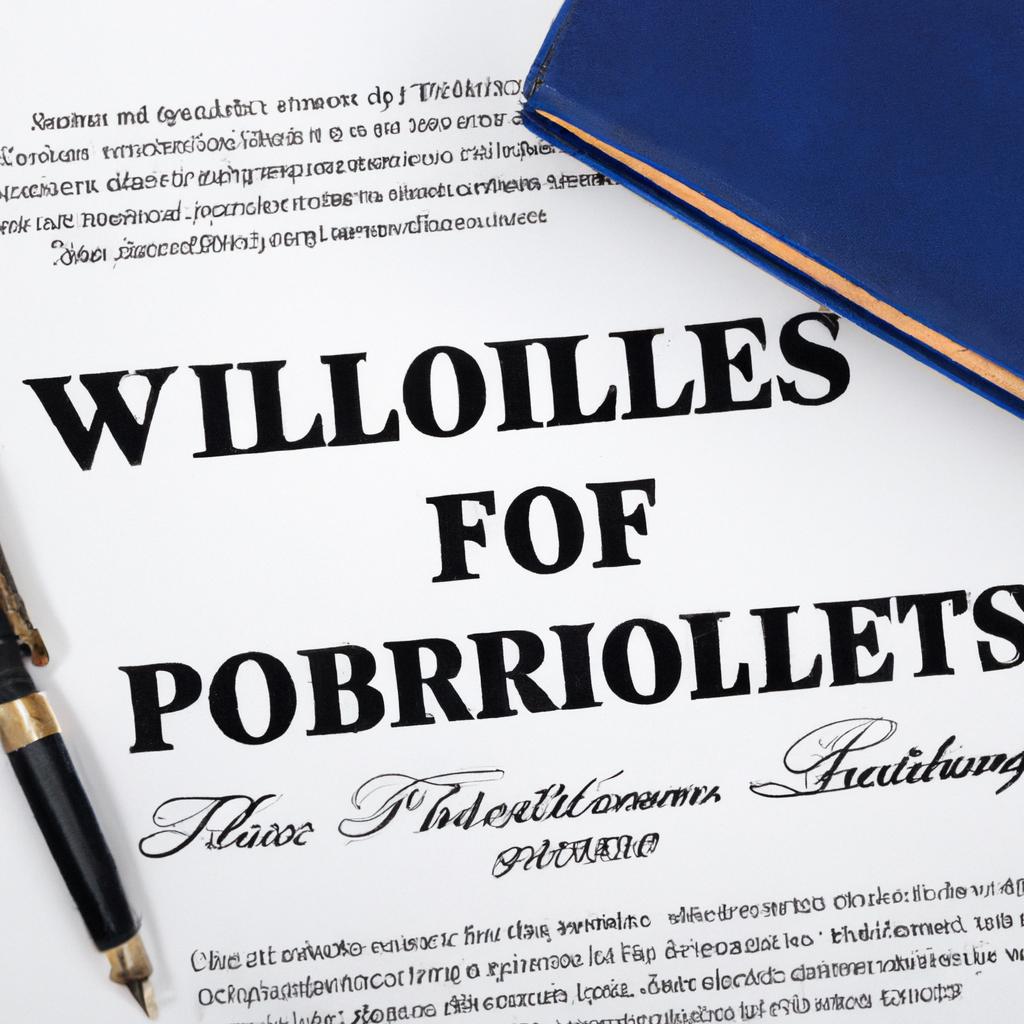As seasoned legal professionals at Morgan Legal Group, based in the bustling city of New York, we often field inquiries from clients about the intricate process of probating a will. Understanding the nuances of when a will goes into probate is essential for those navigating the complexities of estate planning and administration. In this article, we will delve into the key factors that determine when a will enters probate, shedding light on this crucial aspect of ensuring the seamless transfer of assets and property in accordance with an individual’s final wishes.
Understanding the Probate Process for Wills in New York City
When a loved one passes away in New York City and leaves behind a will, it is important to understand when the will goes into probate. Probate is the legal process of validating a will and administering the estate of the deceased according to their wishes. Here are some key points to keep in mind about when a will goes into probate in New York City:
Factors that determine when a will goes into probate:
- Timeliness of filing: The will must be filed with the Surrogate’s Court in the county where the deceased resided within a certain timeframe.
- Validity of the will: The court will need to determine if the will is valid and meets the requirements of New York State law.
- Contesting the will: If there are any disputes over the validity of the will, the probate process may be delayed as these issues are resolved.

Key Factors that Determine When a Will Goes into Probate
There are several . Understanding these factors is crucial in navigating the legal process after a loved one’s passing. Probate can be a complex and lengthy process, but knowing when a will goes into probate can help streamline the proceedings.
Some include:
- Valid Will: The first step in determining when a will goes into probate is ensuring that the will is valid. This includes making sure that the will meets all legal requirements and has been properly executed.
- Death of the Testator: A will typically goes into probate after the death of the testator, the person who created the will. This triggers the legal process of probate to validate the will and distribute the assets according to the testator’s wishes.

Navigating the Legal Requirements for Initiating Probate Proceedings
Before a will can go into probate, there are specific legal requirements that must be followed. Understanding these requirements is essential for initiating probate proceedings smoothly. One of the key steps in this process is determining the validity of the will. This involves ensuring that the document meets all legal criteria, such as being properly executed and signed by the testator.
Additionally, it is important to identify the executor named in the will, as this individual will be responsible for overseeing the probate process. The executor will need to file the will with the appropriate court and begin the process of administering the estate. With the guidance of experienced legal professionals, can be a manageable and efficient process.

Expert Recommendations for Executors and Beneficiaries Involved in Probate
As an executor or beneficiary involved in probate, it is important to understand the process and timeline for when a will goes into probate. Probate is the legal process of proving a will and settling the estate of a deceased person. Here are some expert recommendations to guide you through this often complex and time-consuming process:
For Executors:
- File the will with the probate court
- Notify beneficiaries and creditors
- Collect and inventory assets
- Pay debts and taxes
- Distribute remaining assets to beneficiaries
For Beneficiaries:
- Be patient, as probate can take several months to years to complete
- Stay informed by communicating with the executor and attending court hearings
- Seek legal advice if you have concerns about the handling of the estate
- Understand your rights and responsibilities as a beneficiary
Q&A
Q: What is probate?
A: Probate is the legal process by which a deceased person’s will is validated and their assets are distributed to their beneficiaries.
Q: When does a will go into probate?
A: A will goes into probate after the person who created it passes away. The court will oversee the administration of the estate and ensure that the terms of the will are carried out.
Q: What factors can delay the probate process?
A: Factors that can delay the probate process include disputes over the validity of the will, unclear instructions in the will, or challenges to the appointed executor.
Q: How long does the probate process typically take?
A: The length of the probate process can vary depending on the size and complexity of the estate, as well as any challenges that may arise. It can take anywhere from a few months to several years to complete.
Q: Are there ways to avoid probate?
A: Yes, there are ways to avoid probate, such as setting up a living trust, naming beneficiaries on retirement accounts and life insurance policies, or holding property jointly with rights of survivorship.
Q: What happens if someone dies without a will?
A: If someone dies without a will, their estate will be distributed according to the intestacy laws of their state. The court will appoint an administrator to oversee the distribution of assets.
Future Outlook
In conclusion, understanding when a will goes into probate is crucial for ensuring that the deceased’s assets are distributed according to their wishes. By following the proper legal procedures and seeking the guidance of a qualified attorney, you can navigate the probate process with confidence and peace of mind. Remember, probate may be daunting, but with the right knowledge and resources, you can successfully manage this important step in the estate settlement process. Stay informed, stay prepared, and stay vigilant in honoring the legacy of your loved ones.
 Will creation is an essential and often overlooked aspect of estate planning. A will is a legal document that outlines a person’s wishes regarding the distribution of their assets and property after their death. However, simply having a will in place is not enough to ensure that your assets are distributed according to your wishes. The process of transferring assets after a person’s death is known as probate, and understanding when a will goes into probate is crucial for every individual who wants their final wishes to be respected.
Will creation is an essential and often overlooked aspect of estate planning. A will is a legal document that outlines a person’s wishes regarding the distribution of their assets and property after their death. However, simply having a will in place is not enough to ensure that your assets are distributed according to your wishes. The process of transferring assets after a person’s death is known as probate, and understanding when a will goes into probate is crucial for every individual who wants their final wishes to be respected.
In this article, we will discuss the concept of probate, its significance, and answer the crucial question: when does a will go into probate? We will also explore the steps involved in the probate process and discuss the benefits of avoiding probate. So, let’s dive in!
Understanding Probate
Probate is a legal process that occurs after a person’s death. It involves the court overseeing the distribution of a deceased person’s assets and property to their beneficiaries as per their will. The purpose of probate is to ensure that the deceased’s debts are paid off and their remaining assets are distributed to the designated beneficiaries.
The court appoints an executor or personal representative, typically named in the will, to handle the probate process. The executor’s role is to gather and inventory all of the deceased’s assets, resolve any outstanding debts or taxes, and distribute the remaining assets according to the terms of the will.
When Does a Will Go Into Probate?
Now, let’s address the question at hand: when does a will go into probate? Generally, a will goes into probate after the death of the testator, the person who made the will. However, there are a few circumstances where a will may not go through probate, including:
1. When the deceased has a Living Trust: A living trust is a legal entity created during a person’s lifetime to manage their assets. If a person has a living trust, their assets will not go through probate as they are already owned by the trust and will be distributed as per its terms.
2. When the assets have designated beneficiaries: Certain assets, such as life insurance policies, retirement accounts, or bank accounts with a designated beneficiary, do not go through probate as they pass directly to the designated beneficiary.
3. When the value of the estate is below a certain threshold: In some states, there is a threshold for the value of the estate that determines whether it needs to go through probate or not. If the deceased’s assets and property fall below this threshold, probate may not be necessary.
Benefits of Avoiding Probate
As we have discussed, the probate process can be lengthy, costly, and emotionally draining for the deceased’s loved ones. For this reason, many people choose to avoid probate by taking certain steps, such as creating a living trust or designating beneficiaries for their assets.
By avoiding probate, you can also preserve your privacy as probate is a public process, and anyone can access the will and other documents associated with it. Avoiding probate can also help you save on court fees and other expenses associated with the process.
Steps Involved in the Probate Process
If a person dies with a will, the probate process typically follows these steps:
1. Filing the will with the court: The first step is to submit the original will to the court in the county where the deceased resided.
2. Validating the will: The court will validate the will’s authenticity and ensure that it meets the state’s legal requirements.
3. Identifying assets and debts: The executor will prepare an inventory of all the deceased’s assets and debts and submit it to the court for approval.
4. Paying off outstanding debts and taxes: The executor must use the assets of the estate to pay off any outstanding debts or taxes of the deceased.
5. Distributing assets to beneficiaries: Once all debts and taxes have been settled, the remaining assets of the estate will be distributed among the beneficiaries as per the terms of the will.
6. Closing the estate: After the assets have been distributed, the executor will file a final accounting with the court and close the estate.
Practical Tips to Avoid Probate
Here are some practical tips to help you avoid probate and ensure that your assets are distributed according to your wishes:
1. Create a Will: The most effective way to ensure that your final wishes are carried out is to have a will in place. It will protect your assets and provide clear instructions for the distribution of your assets and property.
2. Create a Living Trust: As discussed earlier, transferring assets to a living trust can help you avoid probate and provide more control over your assets.
3. Designate Beneficiaries: Make sure to designate beneficiaries for your retirement accounts, life insurance policy, and other assets to bypass probate.
4. Keep your list of assets updated: Ensure that your list of assets is updated regularly and properly managed, which can help your executor during the probate process.
5. Seek Professional Advice: Consulting an estate planning attorney can help you understand your state’s probate laws and guide you through the process of creating a will or trust.
Conclusion
The probate process is an essential aspect of estate planning and ensures that a deceased person’s final wishes are honored. A will goes into probate after the death of the testator, and understanding the steps involved can help you make informed decisions about your estate plan. However, avoiding probate can save your loved ones from the emotional turmoil and expenses associated with the process. By following the practical tips mentioned above, you can ensure that your assets are distributed smoothly and efficiently after your death, bringing you peace of mind.

